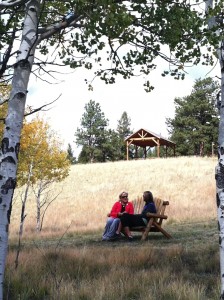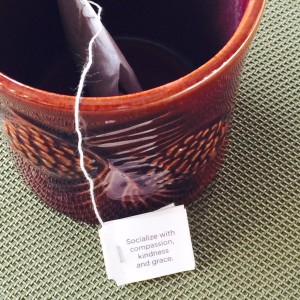 Growing up a Baptist, I never even heard of the Fixed Hour Prayers, the Daily Office or Divine Office until I, like Paul, learned to put aside childish spiritual ways and be a man in my spiritual journey. In my spiritual tradition, spontaneous and heart felt prayers were what was admired. As a boy, I remember my father driving us home from church chiding a fellow deacon because he read his prayer during worship—an act that no one who walked closely with God should ever do. To my father and for me, it was unthinkable that saying a prayer would not be heart-felt, said at the moment and spontaneous. God forbid! Growing up for many of us in our spiritual lives involves re-thinking or perhaps learning for the first time how important praying is a regular and consistent times of the day.In my long journey now of walking with God, there is no practice I enjoy more and no prayers I like to pray more than old prayers and in addition, in order to live with rhythm and to make space for God in my life, I practice Fixed Hour Prayers or Daily Office as much as I can. Let me explain. Here are five reasons why I do this and you might want to do it also:
Growing up a Baptist, I never even heard of the Fixed Hour Prayers, the Daily Office or Divine Office until I, like Paul, learned to put aside childish spiritual ways and be a man in my spiritual journey. In my spiritual tradition, spontaneous and heart felt prayers were what was admired. As a boy, I remember my father driving us home from church chiding a fellow deacon because he read his prayer during worship—an act that no one who walked closely with God should ever do. To my father and for me, it was unthinkable that saying a prayer would not be heart-felt, said at the moment and spontaneous. God forbid! Growing up for many of us in our spiritual lives involves re-thinking or perhaps learning for the first time how important praying is a regular and consistent times of the day.In my long journey now of walking with God, there is no practice I enjoy more and no prayers I like to pray more than old prayers and in addition, in order to live with rhythm and to make space for God in my life, I practice Fixed Hour Prayers or Daily Office as much as I can. Let me explain. Here are five reasons why I do this and you might want to do it also:
- Praying at a regular times of the day is an ancient practice revealed in the Bible.
The prayer book for the early Christians was the Psalms. They prayed the Psalms and knew the psalms and shared the Psalms as their primary source of spiritual encouragement. The Psalmist said, “Seven times a day do I praise thee.” Psalm 119:164. Most pastor and missionaries that I work with rarely pray. Most do not pray with their spouses and few pray as a family. The same is true of marketplace leaders and small business folks. Who has time to pray once, much more SEVEN times a day? Most of us feel fortunate to say a quick prayer before we scarf down our corn flakes or power drink because we need to be on to the next thing.We are too busy to pray. Yet, praying at fixed times of the day is the primary way to call our attention back to God—to become aware and awaken to a different cadence of life than power, money and self-promotion.[tweetthis]Fixed hour prayers call busy and ordinary people to live in a daily rhythm of putting ourselves in the presence of God in a conscious and meaningful way.[/tweetthis]It's called Fixed hour prayers because our spiritual fathers and mothers chose regular and consistent times to come together, drop what they were doing and turn to God. There are several different versions of what times people actually practiced fixed hour prayers but in general, there is a morning time, a noon-time, an end of your work time and a before you go to sleep time. Of course, people have added to these and subtracted from these. Some times of prayers are strict such as in monastic communities. Some, like myself, find a more relaxed and less structured way to practice this ancient way of praying. We are much more tolerant and forgiving and we do it as we can and when we can. At our work of Potter's Inn, we do this on our Soul Care Days and in our retreats. Its often the highlight for many guests to first learn about this--then engage in the doing of Fixed Hour prayers. Yet to be honest, we are not all on the same page when it comes to this. What I can tell you is that this one practice has brought my marriage more together. It has given Gwen and I something we do together which closes the gap between us. It is a simple, non-threatening way to share our hearts and some time.One man at our retreat pulled me aside to say, "You taught me about this years ago. I want you to know that fixed hour praying is the best thing that my wife and I have EVER done in our marriage. It's brought us together in a way I never thought possible." I hear this alot as people engage in this practice.
- Praying at regular times of the day helps order my day; lessen the chaos and calls me back to what really matters in life.
Like you, I live a full life. My day is full of appointments, meetings and errands. Yet, when I know that my time of prayer is coming, I have the opportunity to stop what I am doing and this stopping is my primary way of structuring my life for what really counts. I stop. I pray. I reflect. I pause. Then I move back into my life. But the stopping and praying orders my internal chaos and loosens the chains I feel when I live by the tyranny of the urgent. Gwen sets her time of prayers on her iphone. A bell rings and calls her to pause, pray and look up. We need these reminders. I have some recommendations for you at the end of this blog.The famous painting by the French artist, Jean Francois Millet, “The Angelus” reveals a couple standing in the field, stopping to pray. They have evidently just heard the church bells sound out the chimes that everyone needs to stop. Everyone needs to pray. Everyone needs to lift up their eyes from the working world to their God and say a few words. I love this painting. But without church bells, we have nothing telling us to stop. We have nothing helping us live in rhythm. We have nothing telling us to live for something more than money. Praying at regular, fixed times of the day, gives internal order to a chaotic life. The collapse of time, where everything is busy and everyone is over-committed is in my opinion the number one reason the wheels of the buses are flying off of our lives and we are collapsing in exhaustion and fatigue---with no time for God or being with God.
- I pray the Fixed Hour Prayers because as I pray—I find myself in community.
For me, the most powerful motivation for praying a regular times of the days is this: When I pray at Fixed Hours, I am reminded that I am not alone. But how does this happen? It happens to me because I know that many of my friends across the world are practicing what I am practicing. I begin praying alone but somehow find myself in the midst and company of a holy few--a group of men and women, who like me, are doing what pilgrims have done for thousands of years.I have a close friend who lives in Africa. When I pray at regular times, I know that David is praying—or has already prayed the same and exact prayer I am about to say. I realize that my friend, Fil, who lives in North Carolina has prayed the prayer I am about to say—but he said it in his own time zone which is two hours before me. I also realize that my friend who lives in California will soon be opening up his prayer book and talking to God about the exact same thing I just told God. We come together in prayer and in the praying a gap of time and years is closed.It’s uncanny how this works—but it does work. I have the deepest sense of community by praying at regular times of the day and this mystery is deep, profound and comforting. Every time I pray like this, I am not alone.
- I pray at fixed hours because it is easier than not praying at all.
In my work with leaders, you’d be surprised at how man times I hear pastors, missionaries and other Christian leaders who try to do it all well, confess that they rarely, if ever pray. Many will try to have a “quiet time” or will attempt to read the Bible for a few moments. But then an inner committee meeting begins in their heads telling them; shaming them; nagging them to do something more important. So prayer is dropped and their inner life runs a muck.Prayer is perhaps the greatest practice of the spiritual life that people struggle with. The disciples sure struggled with prayer. Ignorant of how to do it, they pleaded with Jesus, "Teach us to pray." That same plea, I think, is the private plea of most people I encounter--in the church! We just need help and cannot assume we actually know how to pray; when to pray and what to pray. Fixed hour prayer is a mentor to us.Let me be truthful, we often do not know what to pray or how we should pray. As a result of these two traps, we often do not pray at all. When we follow historic, ancient prayers, we don’t have to make up holy words or try to impress God. We simply say that is right there before our eyes and hearts. We enter a long-standing chorus of men and women who have gone before us that have discovered what I am discovering. Fixed hour prayers really work. Fixed hour prayers really help.
- I pray at Fixed hours because Jesus prayed at Fixed hours and so did Paul and Peter and the early church.
A few years back, I wrote the book, “The Jesus Life.” The writing of this book changed my life. I fell in love with Jesus all over again and I realized that Jesus’ ways of living were really pathways for me to live. The early followers of Jesus were not called Christians but followers of “the way.” We are told this five times in the book of Acts! I believe we modern folks, have lost our way. We’ve traded ancient and proven ways for modern day shortcuts to almost everything in life that is dear to us.Jesus prayed the Psalms. So, it’s this simple. If I want to be like Jesus, I need to pray the Psalms. Knowing that Jesus prayed at regular times of the day motivates me to want to do the same. When I realize that the early church did this, I want to follow in their way. The modern church has lost it's footing here. We have failed people by ignoring this ancient way of talking to God and being with God.Paul and Peter prayed at fixed hours ( Acts 3:2 and 10:9). It’s not odd or weird to realize that as the early followers of Jesus began to embrace and integrate their new way of living that they felt it important to pray at regular times of the day.When I realized this—I was greatly helped. When I read about Daniel who we’ve heard stories about in the lion’s den praying at Fixed hours, I was also encouraged (see Daniel 6:13).I’m afraid, we’ve thrown the baby out with the bath water. In our attempts to accomplish more and to live productive lives, we’ve abandoned ancient spiritual practices that offer us hope and a renewing of our inner life. Fixed hour prayers is one such practice that truly can revolutionize your life. I think you should join me and thousands of others in this practice and just see what you think. I'd like to know your thoughts---your resistance and your celebration of this way of praying! Here are some resources to help you begin or continue the practice of Fixed Hour Prayers.
- Explore a Community in Europe living by FIxed Hour prayers and join them with an APP!
- Here's the OnLine Version I used every day- and multiple times and it has an APP also!
- Here is the Daily Office produced by Phyliss Tickle and sits by our chairs in our home. We use this far, far more than any other version. It's easy to use and has an excellent Introduction to Fixed Hour Prayers we use at Potter's Inn.










